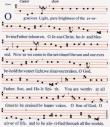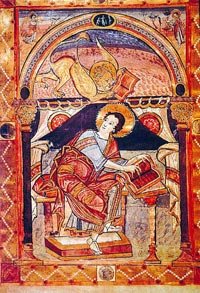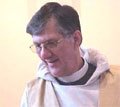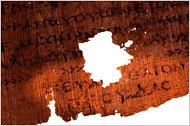
What you are about to read is taken from today's online publication of
Sojourners. The article was adapted from Jim Wallis' reflections at Sojourners' Ash Wednesday service March 1, 2006.
___________________________
We all know Lent is meant to be a time of reflection, deepening, and preparation for Easter. Lent is also a call to repentance and, especially, humility. With Lent's beginning on Ash Wednesday, we impose (I love that word) ashes as a very physical, visual, and tangible act of repentance and humility - a mark and act of commitment, not merely a rote ritual.
Some members of our staff have suggested to me that the events of recent weeks and months call us to humility. But humility is a difficult virtue for those who are called to a prophetic vocation - people like us.
Humility is difficult for people who think they are, or want to be, "radical Christians."
Humility is difficult when you're always calling other people - the church, the nation, and the world - to stop doing the things you think are wrong and start doing the things you think are right.
Humility is difficult for the bearers of radical messages.
When we're always calling other people to repent and change, it's not always easy to hear that message for ourselves.
I want to suggest that there is a real and very deep tension between humility and the prophetic vocation. And most prophetic Christians I have known - present company and preacher included - are really not very good at humility.
You see we are always making judgments of others - church leaders, political leaders, majority cultures - but are not often good at applying the judgment to ourselves. Even when the prophetic judgments we are making are necessary, they seldom lead us to humility. After all, we are the ones who know how other people are supposed to change. We are the ones with the answers. We are the ones who are doing it right.
How do we preach like Amos - "Let justice roll down like waters, and righteousness like a mighty river!" - without becoming self-righteous ourselves? I think that is very difficult. Perhaps Micah had it right: "What does the Lord require of you but to do justice, and to love kindness, and to walk humbly with your God?"
And we are especially prone to turn our righteous judgments on each other, at those close at hand, even within our own community - and that can be especially destructive. When that happens, if the truth be told, radical Christian communities are not always pleasant places to be.
When the prophetic indignation we offer daily to the world is turned toward those who happen to be in judging, glaring, or shouting distance of us when we decide they too have fallen short of our ideals - look out!
And let me be human and honest enough to say that leaders in church, state, and certainly faith-inspired organizations should always be held accountable, but being a leader in a prophetic Christian community is often a very hard place to be. Just look at the qualities necessary for the prophetic vocation: The capacity to speak clearly, strongly, boldly, decisively, distinctively, and of course, visibly. I would say, from my experience, that none of those qualities lead directly to humility.
Likewise, the call to be and offer an alternative reality, community, vision, lifestyle, etc., requires an energy and confidence that, again, is not necessarily prone to humility.
So what can save us radical Christians? The same thing that saves everybody else: the grace of God.
I've found myself remembering an old article prompted by a time in the life of
Sojourners when these issues were very much at play. It was an article I felt quite convicted to write as a correction to ourselves, to myself, to the prophetic vocation we had chosen. I remember I stayed home from a prophetic anti-nuclear action that many of us were undertaking because I felt the need to think and write instead. It's from May of 1979. It's pretty faded now, but I think it might be relevant to us today:
"Sojourners has written much and often about the abuse and cheapening of grace. In many ways, it is the place where we began. That concern still stands; cheap grace continues to be the greatest affliction of the churches.
"Radical Christians, however, face another problem. It is the tendency to seek justification in our lifestyle, our work, our protest, our causes, our movements, our actions, our prophetic identity, and our radical self-image. It becomes an easy temptation to place our security in the things we stand for and in the things we do, instead of in what God has done. It is a temptation to depend on things other than God's grace.
"'For by grace you have been saved through faith; and this is not your own doing, it is the gift of God - not because of works, lest [anyone] should boast (Ephesians 2:8-9).' Grace is the logic of a loving God. There is nothing we can do to earn it, win it, or deserve it. Grace is simply a gift, not a reward. We can receive it only by faith, not through good works.
"Grace saves the prophetic vocation. The knowledge and experience of grace can ease the seriousness with which we tend to take ourselves. Grace can restore our humility, our sense of humor, and our ability to laugh at ourselves. All are regularly needed by prophets.
"To trust grace is to know that the world has already been saved by Jesus Christ. It is to know that we cannot save the world any more than we can save ourselves. All our work is done only in response to Christ's work. To receive the gift of grace is to let go of self-sufficiency and to act out of a spirit of gratitude.
"Radical Christians must pursue more than a successful strategy; we must seek a deeper faith. Only then will we have the assurance of salvation, not because of what we have accomplished, but because we have allowed God's grace and mercy to flow through our lives."

 During Evening Prayer, both the Episcopal Book of Common Prayer (BCP) and the Lutheran Daily Prayer of the Church (DPC) encourage the saying or singing of the Phos Hilaron, the so-called “lamp-lighting hymn.” In the late fourth century St. Basil (c. 329 - 379) tells us that the Phos Hilaron was used as a hymn centuries before him. Some say that the martyr St. Athenogenes sang the Phos Hilaron in joy as he entered the flames. St. Justin the Martyr refers to the text of the hymn about 150 A.D. (Dialogue with Trypho). This is truly an old, old hymn, most likely the most ancient post-Biblical song we sing. Inasmuch as the ancient Jewish and Christian day always begins in the evening, the Phos Hilaron lets us enter each new day with praise and joy. The Eastern Churches have always sung this evening hymn daily, ever since the second century.
During Evening Prayer, both the Episcopal Book of Common Prayer (BCP) and the Lutheran Daily Prayer of the Church (DPC) encourage the saying or singing of the Phos Hilaron, the so-called “lamp-lighting hymn.” In the late fourth century St. Basil (c. 329 - 379) tells us that the Phos Hilaron was used as a hymn centuries before him. Some say that the martyr St. Athenogenes sang the Phos Hilaron in joy as he entered the flames. St. Justin the Martyr refers to the text of the hymn about 150 A.D. (Dialogue with Trypho). This is truly an old, old hymn, most likely the most ancient post-Biblical song we sing. Inasmuch as the ancient Jewish and Christian day always begins in the evening, the Phos Hilaron lets us enter each new day with praise and joy. The Eastern Churches have always sung this evening hymn daily, ever since the second century.










